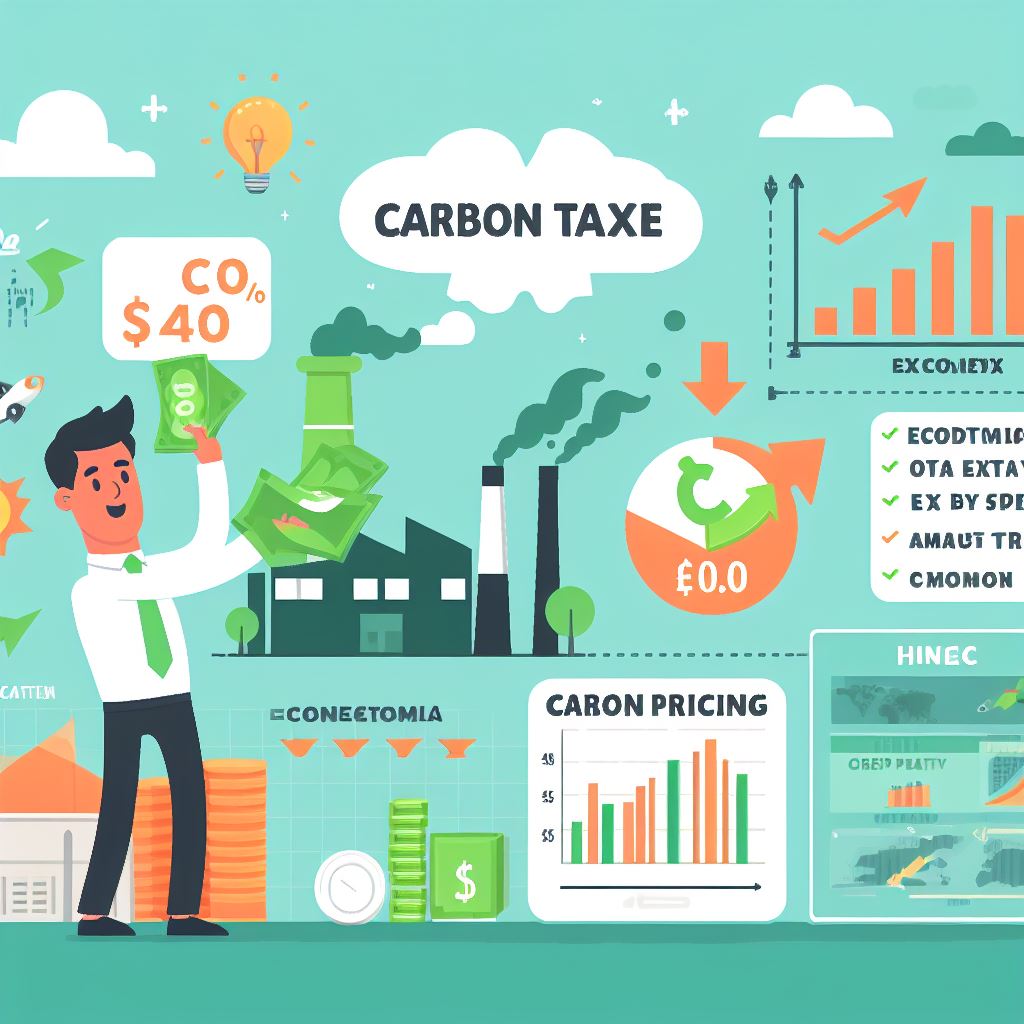Housing is an important issue today and will probably remain so for the foreseeable future. Governments would have to implement land policies and create incentives. I would gear those incentives towards providing housing options by supporting the rental market. Creating options where the market has not provided can restore balance

Implementing carbon taxes is a way for society to factor in the cost of pollution emitted. We enjoy the comfort and advantage of driving, however, that comes at a cost. While the benefits accrue entirely to the user of the car, everyone else pays in the form of pollution.
In this piece, we will explain how a carbon tax can help address climate change. Our discussion will focus on the direct impact experienced by consumers. One of those direct impacts is through the price we pay at the gas pump, although we levy carbon taxes on all carbon emitting facilities. A simple calculation shows that the impact is substantial. The carbon tax on gasoline, which is levied on a per litre basis, will increase over the years in Canada.
This discussion can apply to any industry. The only distinction would be the impact of the tax.
So how do we factor in the cost incurred by society?
From a societal point of view, market prices without taxes are too low. The industry does not factor the cost of pollution in the market price. Sellers and retailers of gas only incorporate the costs associated with production, transportation, distribution, and retail. There is no consideration for the costs associated with CO2 emissions. Here, the government would need to step in and levy a tax such that the price per litre of gasoline reflects environmental costs. We refer to this as a carbon tax, which converts a liter of gas consumption into units of pollution or CO2 per litre and applies a price to it. Greenhouse emission related taxes are very effective at reducing emissions.
From an economic stand-point, using a price as a mechanism to control demand is a practical method of fighting climate change. Since the price can facilitate the reduction in consumption of fuel and thus reduce emissions. From a societal point of view, without a carbon tax, we would be over-consuming fuel. The higher price will incentive drivers to drive less or buy more fuel-efficient vehicles.
A rise in price because of carbon taxes or even market prices can help reduce consumption to levels that are manageable. Governments can impose taxes to change consumer behavior towards fuel consumption and lessen the impact on our climate. Governments can also use the reduction in gas consumption because of the carbon tax to meet targets for international and climate change agreements.
Where should we invest carbon tax revenues?
It’s fairly easy to collect gas taxes for carbon emissions, but allocating those revenues to climate change initiatives only can be a challenge. Governments can use the extra funding to finance their budget deficits, directly or indirectly. The government should instead use the funds to fund carbon-reducing infrastructure, provide incentives for industry and individuals, and invest in the research and development of carbon-reducing technologies.
Electric car rebates are one example of a policy a government can implement and fund using carbon taxes. Ultimately, it is difficult to alter consumer behavior without providing alternatives and ensuring that those alternatives are accessible.
Equity is at stake when implementing carbon taxes…
The tax is fair since it’s linked to consumption. Governments impose the tax on a per unit basis and the total amount purchased for sales taxes. There are equity implications since consumers experience the impact of the tax differently. The carbon tax may be inequitable in the sense that it places a greater burden on those with lower-incomes. Since everyone would pay the same tax for the same level of gas consumption. However, the tax represents a greater share of their income.
The total carbon tax bill will be a higher share of a low-income person’s income. One way to solve this issue is for government to pay-out. In Canada, low-income residents are eligible for carbon tax rebates from the federal governments. The tax credits either reduce an individual’s or family’s tax bill or increases their tax refund.
The verdict on carbon taxes…
The carbon tax is a clear winner when it comes to effectiveness and fairness. However, there does remain skepticism about the use of the proceeds from taxes and permits equally. Equity is also at steak if governments don’t use their tools to address it by using targeted rebates and tax breaks.
Home ownership, a policy blunder
At the core of government policy is solving one of society’s challenges, housing. Adequate housing is essential to protect the health and safety of individuals. It’s a simple right for all inhabitants. The approach taken in Canada, did not achieve its goals and failed to address a growing housing crisis.
In this article, we will discuss how governments implement programs in housing to create artificial economic expansion. We will also talk about the impact our society on our decisions and how it’s adding to the current housing crisis. The discussion will cover considerations for home buyers and what they should consider when making a decision.
We use home ownership as a source of economic growth
Governments use home ownership and the housing sector as a source of economic growth. They do this by implementing policies that promote home ownership. These policies include all from incentives to relax rules around qualifying for a mortgage. Some of these policies financially trap owners and cannot provide sustainable and long-term economic growth and fix the housing mess.
A home is not a source of economic gain because it does not provide output or production of any good or service. We should make investments in living options for all Canadians, not just those seeking ownership. Owning a single home has turned into a societal norm. As a result, builders and potential buyers do not favor other housing choices.
To promote economic growth for the long-haul, we need investments in productive capital and infrastructure. This includes investing in roads, railways, factories, and research labs. We should also invest in Canada’s approximately $100 billion infrastructure deficit, creating another source of economic growth for both the short and the long term. Reliable infrastructure enables an economy to function at its full capacity.
Social norms, habits, and constructs boost the demand for home ownership
Home ownership is not just a social construct, but also an expensive social practice. Many occupations depend on it; lawyers, mortgage agents, financial planners, banks, tellers, and real estate agents. The list goes on. Advocates of ownership claim that buying is always better than renting. This is a common misconception. Ownership comes with other costs other than mortgage payments that this claim ignores. Like Upton Sinclair said, “It is difficult to get a man to understand something when his salary depends on his not understanding it.”
There are other hidden and indirect costs of premature home home ownership. This includes costs like labor immobility and the opportunity cost of capital. Owning a housing can lead you to lose your labor versatility when you are looking at job opportunities outside your area. Also, the equity you build in a house could be invested elsewhere for a higher return, if available. The latter is what we refer to as the opportunity cost of capital.
So what does this all mean to you…
If you are facing the dilemma of whether to rent or buy, some , try this rent vs. buy calculator first. This is a simple tool that can help you make a sound decision. This calculation takes into consideration a variety of factors that should be part of the math when considering to purchase a home.
Home ownership is not for everybody. As with any other major financial decision, we must assess it adequately. Renting is fine, as long as we are saving and investing for the future.
Conclusion
Housing is an important issue today and will probably remain so for the foreseeable future. Governments would have to implement land policies and create incentives. I would gear those incentives towards providing housing options by supporting the rental market. Creating options where the market has not provided can restore balance.
Economic growth should be sourced from sustainably, where an impact has a lasting effect on our quality of life. Finally, buying a home is a big decision and requires careful financial consideration and planning. However, making rational decisions can be difficult under social pressure so we must be aware so we don’t surrender to it.
Related Articles
Should I rent an apartment or buy a condo?
Owning a home is not always better than renting. In fact, we demonstrate that in especially hot housing markets like Toronto’s, renting is far cheaper than buying. This is true even when considering moderate future price increases. The example uses the rent vs buy calculator and is based on a 1-bedroom apartment I was trying to decide between buying or renting.
Six common mistakes investors make
Trade volumes have skyrocketed over the last decades and since investors from all skill and awareness levels are joining the market, understanding investor psychology is increasingly necessary. Advances in technology have eliminated the obstacles to entry for new investors.
Home ownership, a policy blunder
Housing is an important issue today and will probably remain so for the foreseeable future. Governments would have to implement land policies and create incentives. I would gear those incentives towards providing housing options by supporting the rental market. Creating options where the market has not provided can restore balance.


